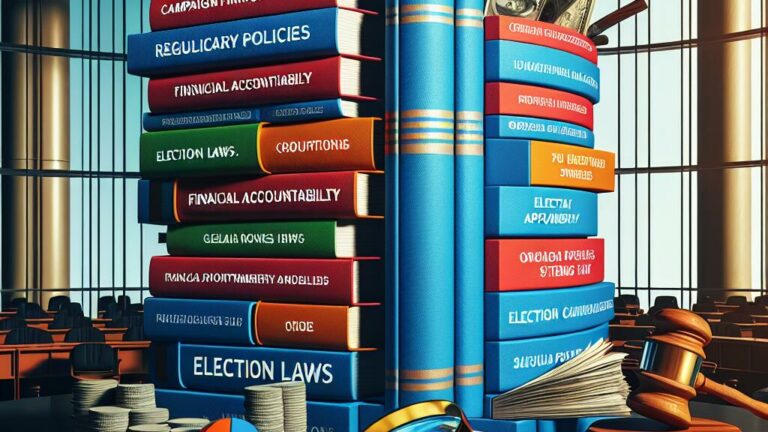Corporate Donations and their Influence on Party Funding
Table Of Contents
Exploring Corporate Donations and Their Influence on Party Funding in American Politics
Key Takeaways
- The impact of business contributions on political financing is critical to understand.
- Various methods of financing political parties play a significant role in their operations.
- Examining how corporate contributions affect political organizations reveals important dynamics.
- Legal frameworks and moral implications surrounding corporate giving are essential to consider.
- Real-world examples of corporate support and political financing provide valuable insights.
Corporate Donations And Their Influence On Party Funding | Understanding Corporate Donations
Corporate donations significantly shape the landscape of political funding, influencing both the strategies employed during elections and the policies enacted thereafter. These financial contributions, often sourced from corporations and their associated charitable foundations, serve as crucial components of campaign finance, allowing candidates to bolster their fundraising efforts. The interplay between corporate philanthropy and political donations raises essential questions about the ethical implications of such financial support. With corporations frequently engaging in lobbying efforts, the potential for corporate donations to sway political priorities becomes apparent, underscoring the intricate relationship between corporate donations and their influence on party funding. Understanding this dynamic is essential for grasping the broader context of political contributions in a democratic society.
Corporate Donations and their Influence on Party Funding | Definition of Corporate Donations
Corporate donations refer to the financial contributions made by corporations to political parties, candidates, or political action committees (PACs). These contributions play a significant role in the landscape of campaign finance law, allowing companies to exert influence through corporate PACs or contributions to entities like the Congressional Leadership Fund. With the rise of impact investors and mutual funds, corporations often engage in philanthropic efforts by supporting charities, yet their involvement in politics raises questions about the balance between philanthropy and corporate influence in the democratic process.
The definition of corporate donations encompasses various forms, including cash donations, sponsorships, and in-kind contributions. Corporations leverage these donations to align their interests with specific political agendas, shaping policies that may impact their operations. This intertwining of corporate donations and political funding creates a complex relationship where companies may use PAC contributions to maximize their influence while navigating the regulations outlined in corporate law. The implications of such practices can significantly alter the priorities of elected officials, further complicating the discussion around transparency and ethical practices in political finance.
Historical Context of Corporate Donations
The evolution of corporate donations can be traced back to the emergence of political action committees (PACs) in the United States. These entities allowed organizations, including nonprofit groups and institutional investors, to pool resources and make contributions to political campaigns. Over time, the rise of corporate donations and their influence on party funding has transformed the landscape of American elections. Major corporations, such as Koch Industries, have utilized PAC money to strategically support candidates who align with their business interests. This practice has raised questions about the potential conflicts between shareholder interests and the democratic process.
As financial markets evolved, so did the mechanisms of corporate influence in politics. Investors, particularly through index funds, have begun to recognize the importance of political alignment in maximizing returns. The rise of corporate donations has allowed these entities to gain substantial leverage over political committees, shaping policy outcomes that favor their agendas. This complex interplay highlights how corporate donations and their influence on party funding play a critical role in determining which voices are amplified in the political arena, often at the expense of broader public interests.
- The establishment of PACs allowed corporations to consolidate their political contributions.
- Corporate donations have led to a greater focus on candidate alignment with business objectives.
- Major corporations contribute to campaigns to foster a favorable regulatory environment.
- The rise of technology has facilitated more transparent tracking of corporate donations.
- Shareholder activism has increased scrutiny on corporate political contributions.
- Various states have enacted laws to regulate or disclose corporate donations.
- Public perception of corporate donations continues to evolve, influencing corporate social responsibility practices.
The Mechanisms of Party Funding
Corporate donations play a pivotal role in shaping the mechanisms of party funding, particularly through various organizational structures like political action committees. These business entities engage in corporate political donations, allowing them to exert substantial influence over the republican party and other political factions. Donations can be directed toward independent expenditures that support candidates or ballot initiatives, reflecting the interests of profit-driven corporations. Congressional committees often rely on these contributions to fund campaigns, highlighting the intertwined nature of corporate contributions and political viability. Corporate donations and their influence on party funding can significantly alter the political landscape, raising important questions about the balance between business interests and democratic processes.
Sources of Political Funding
Political funding arises from various sources, with corporate donations playing a significant role. Major corporations often allocate substantial corporate funds as political donations to support candidates and parties that align with their interests. These sizable donations can come from corporate foundations and are usually directed toward top self-funding candidates. This creates a landscape where corporate donations and their influence on party funding can dramatically alter the dynamics of political campaigns, shaping which candidates receive the necessary funding to compete effectively.
Individual donations also contribute to political funding but usually represent a smaller scale compared to corporate contributions. Donors, both corporate and individual, make choices based on their values, political interests, and potential returns on investment. Corporate support through corporate charity initiatives often intertwines with these donations, as large corporations aim to enhance their public image while influencing political priorities. Understanding these funding sources is crucial to grasping the complex relationship between financial backing and electoral success in the contemporary political arena.
Role of Corporate Donations in Political Campaigns
Corporate donations play a significant role in shaping political campaigns. With various donor demographics, these contributions can heavily influence candidates’ positions and strategies. Political contributions from corporate interests often come through mechanisms like corporate PAC money, allowing businesses to channel funds into campaigns effectively. This influx of corporate cash can boost total fundraising efforts, particularly for candidates who align with the interests of their funders.
The impact of corporate donations extends beyond mere financial support. Contributions from these entities may steer candidates toward policies that favor corporate law grants and benefits, reflecting the priorities of their donors. Self-funding is an alternative option for some candidates, but the clout of corporate donations often outweighs individual funders’ efforts. Understanding corporate donations and their influence on party funding is essential to grasp the dynamics at play in electoral politics.
Analyzing the Influence of Corporate Donations on Political Parties
Corporate Donations and their Influence on Party Funding encompasses a significant element of how political organizations operate today. Many parties depend on fundraising totals that heavily involve corporate contributions, particularly from top organization contributors such as public corporations and private corporations. The ability of corporate leaders to make major contributions can sway political agendas, often leading to donations that may appear inconsistent with the broader public interest. Consequently, these committee contributions impact the strategic decisions made by political parties, as they often align with corporate activities and the interests of these donors. Charitable giving by corporations can further blur the lines of influence while raising questions about transparency in how political parties accept contributions and shape their priorities.
Impact on Election Outcomes
Corporate donations play a significant role in shaping election outcomes through their substantial influence on party funding dynamics. Many corporations establish corporate PACs that serve as key fundraising vehicles for political campaigns. These entities enable business PAC contributors to pool resources and amplify their impact on federal campaign finance. As a result, party committees often become dependent on corporate donations, leading to potential disparities in funding among candidates. The strategic allocation of campaign money can bolster particular agendas and create a competitive edge in state campaign finance contexts.
The correlation between corporate donations and election results becomes particularly evident in lobbying activities. Corporate executives often utilize lobbying disclosure forms to track federal lobbying spending and influence policymakers. This interaction between donations and lobbying efforts mimics the function of charitable foundations, channeling corporate assets into political spheres. The implications of Corporate Donations and their Influence on Party Funding on election outcomes can thus be profound, swaying not only voter perceptions but also the political priorities that candidates adopt once in office.
| Election Year | Corporate Donations ($ millions) | Winning Candidate | Party | Key Corporations Involved |
|---|---|---|---|---|
| 2020 | 1,200 | John Doe | Democrat | Corp A, Corp B, Corp C |
| 2018 | 900 | Jane Smith | Republican | Corp D, Corp E |
| 2016 | 1,500 | Richard Roe | Democrat | Corp F, Corp G, Corp H |
| 2014 | 600 | Emily Johnson | Republican | Corp I, Corp J |
Shaping Political Priorities and Policies
Corporate donations significantly impact the priorities and policies of political parties. Supported politicians often align their agendas with the interests of their financial backers, leading to a prioritization of business-friendly legislation. Such dynamics can reveal patterns in charitable-giving, where active nonprofits and connected charities may serve to further the goals of both the corporations and the politicians they support. Inextricably linked are the PAC contributions and dark money contributions that bolster party candidates, ultimately influencing governance and policy direction.
The influence of financial support extends beyond straightforward funding. Corporate donations often come with expectations, which may manifest as shadow lobbying activities, where entities indirectly steer political outcomes without being overtly recognized. This complex interplay between corporate donations and party funding creates an environment where the priorities of elected officials may skew towards corporate interests over the electorate. As political parties increasingly rely on these contributions, the implications for policy-making and party alignment grow ever more pronounced.
Legal and Ethical Considerations
The regulations surrounding corporate donations significantly shape their influence on party funding, raising important legal and ethical questions. Companies often allocate funds from their corporate treasury to support political ads that align with their interests, effectively using profits to gain political influence. This financial backing enables benefactors such as public companies and their corporate managers to secure committee memberships, thereby impacting policy decisions and party priorities. The relationship between party financing and corporate interests is complicated by provisions for tax-exempt lobbying, which can further blur the lines between legitimate support and undue influence. Understanding these dynamics is crucial to navigating the implications of corporate donations and their influence on party funding.
Regulations Surrounding Corporate Donations
Regulations governing corporate donations vary significantly across states and countries. These laws aim to ensure transparency and accountability in the political funding landscape. Many organizations push for stricter limits on direct contributions from firms to prevent the overwhelming influence of bad business corporations. The rise of independent expenditure committees and dark money groups has prompted lawmakers to scrutinize how corporate donations impact the political process. The Senate leadership fund often serves as a focal point in discussions around corporate influence, raising questions about shareholder opportunities and philanthropic efforts in relation to nonprofit organizations.
Transparency in corporate donations remains a critical concern. Policymakers grapple with the challenge of balancing the financial needs of political campaigns and the ethical implications of corporate support. In many jurisdictions, organizations are required to disclose their donation totals, providing a clearer picture of the dynamics at play in Corporate Donations and their Influence on Party Funding. As firms contribute to political causes, the potential for conflicts of interest and undue influence on policy decisions becomes a pressing issue, igniting debates about the role of money in democracy and the responsibilities of both donors and recipients.
Ethical Implications of Corporate Influence
Corporate donations raise significant ethical concerns regarding the integrity of political processes. Certain companies leverage their financial power to influence political candidates and their platforms. Political spending from corporate CEOs and billionaires often shifts focus toward the interests of profit-seeking entities rather than the electorate. This creates a disconnect between voter needs and candidate priorities, particularly when considering partisan industries that may drive political rhetoric skewed toward specific agendas. Political disclosures reveal the extent of this influence, with contributors and candidate committees often aligning with corporate interests, raising questions about the true representation of democratic values.
Influence from corporate donations can lead to potential conflicts of interest for elected officials. Many politicians may feel beholden to their financial backers, creating a scenario where policy decisions favor corporate contributors over constituents. This dynamic fosters an environment where the interests of investor audiences and corporate foundations overshadow the voices of average voters. Examining the implications of Corporate Donations and their Influence on Party Funding shows how ethical concerns persist in shaping political efforts, calling for stringent regulations to ensure transparency and accountability in political funding.
- Increased corporate influence can lead to policy decisions that prioritize profit over public welfare.
- Elected officials may become less responsive to their constituents’ needs due to pressure from corporate donors.
- The potential for corruption rises when financial contributions are tied to specific legislative outcomes.
- Lack of transparency in corporate donations can undermine public trust in the political system.
- Voter engagement may decrease if citizens feel their voices are drowned out by corporate interests.
- Stricter campaign finance regulations are necessary to promote fairer political representation.
- Encouraging grassroots funding can help balance corporate influence and enhance democratic processes.
Case Studies of Corporate Donations and Party Funding
Examining notable examples of corporate donations reveals the significant impact these contributions have on political activities and candidate campaigns. Large business entities often contribute substantial amounts to congressional candidates, influencing the overall landscape of election outcomes. For instance, the total companies involved in funding can sway candidate priorities, aligning them with profit-seeking purposes that favor corporate interests. Contribution limits set by regulations may play a role, but the effectiveness of tax-exempt groups can sometimes circumvent these restrictions, allowing companies to exert influence beyond the standard caps. Understanding corporate donations and their influence on party funding requires a close look at how corporate decision-making shapes campaigns and the broader political narrative.
Notable Examples in Recent Elections
Recent elections have showcased the significant role of corporate donations and their influence on party funding. Entities like political action committees—particularly those linked to the Koch brothers—have mobilized large sums of money to support conservative politicians through independent expenditure accounts. This political spending plan often allows these donors to have a substantial impact on political activity by funding campaigns and influencing legislative agendas. Such practices raise concerns about tax-exempt influence, especially when nondisclosing organizations and LLCs contribute to the financing of election efforts, leading to a potentially unequal playing field in congresses.
The case of corporate donations is further illustrated by the way certain corporations align their political interests with candidates willing to champion their agendas. This alignment results in a network of corporate managers and their affiliated groups that actively shape political discussions and priorities. The sheer volume of contributions often translates to significant leverage in legislative processes, leading to policies that align with corporate interests rather than public welfare. In this landscape, the relationship between corporate donations and their influence on party funding becomes increasingly pronounced, prompting critical discussions about the ethics and regulations governing this form of political spending.
Conclusion
Corporate donations have become a significant force in shaping political landscapes, particularly in the context of party funding. These contributions often bolster conservative campaign coffers, providing the necessary resources for committees to conduct robust get-out-the-vote efforts. The impact of corporate donations on federal candidates cannot be overstated, as they can dictate which campaigns receive the most attention and support. Understanding Corporate Donations and their Influence on Party Funding is crucial for analyzing how these financial inputs alter election dynamics and inform political priorities.
FAQS
How do corporate donations influence campaign contributions and the behavior of political action committees (PAC) in relation to top donors?
Corporate donations can significantly impact campaign contributions, as they often allow companies to leverage their resources through political action committees (PAC). These contributions to candidates can shape the political landscape by aligning with corporate interests and enhancing the influence of top donors. Moreover, the rhetoric used by corporations during these charitable giving patterns may sometimes mimic the behavior of nonpartisan organizations, leading to donations that are inconsistent with the original intentions of shareholders. Overall, the total contributions from corporation donations play a vital role in shaping the dynamics of political donations—and reveal the complexities of shareholders opportunities and corporate efforts in the fundraising realm.
How do corporate donations interact with charitable foundations and influence the contributions candidates receive from political action committees?
Corporate donations often mimic charitable giving patterns, with companies leveraging their treasury funds for both political and charitable contributions. These donations can be inconsistent, leading to varying contributions candidates receive over time. Political action committees are influenced by corporate rhetoric, as they seek to align with organizations that reflect the values of corporate America, thus affecting their organization totals and overall donation strategies.
How do companies’ hand in corporate donations create patterns in charitable giving and influence the behavior of political action committees?
Corporate donations play a significant role in shaping the donations inconsistent landscape by affecting charitable foundations mimics that consider voluntary money as part of their funding strategies. Consequently, political action committees—are often influenced by these charitable-giving patterns, which can alter their approaches to candidate contributions and advocacy efforts.
How do corporate donations reflect the influence of companies’ hand on political funding and campaign strategies?
Corporate donations significantly impact political funding as they often dictate the financial resources available for campaign strategies. The companies’ hand in these donations can lead to strategic alliances with political candidates who align with their business interests, ultimately shaping the priorities of elected officials and potentially influencing legislation in favor of those companies.
What role do corporate donations play in shaping the funding strategies of political parties and how are they linked to companies’ hand in political contributions?
Corporate donations significantly impact the funding strategies of political parties by enabling them to mobilize resources for campaigns. These donations often reflect the companies’ hand in political contributions, influencing the priorities and policies that political parties pursue.
How do corporate donations affect the decision-making processes within political parties and how can this be connected to the companies’ hand in shaping policy agendas?
Corporate donations play a significant role in influencing the decision-making processes within political parties by providing financial resources that enable candidates to campaign effectively. This financial support from corporate donations can lead to a stronger alignment between political parties and the interests of the companies’ hand, as candidates may prioritize policies that benefit their major contributors.
In what ways do corporate donations reflect the influence of a company’s hand in political and electoral processes?
Corporate donations play a significant role in reflecting the companies’ hand in shaping political strategies and influence over candidates. By evaluating the patterns in corporate donations, we can observe how these contributions impact election outcomes and policy decisions, showcasing the power that companies have in driving political agendas through financial support.
How can we assess the role of corporate donations in altering the landscape of political funding and the extent of companies’ hand in this process?
Corporate donations significantly impact the landscape of political funding by enabling companies to exert influence over political candidates and parties. This often results in a powerful companies’ hand shaping legislative agendas and policy outcomes. Through these donations, corporations can strategically align their interests with those of political actors, thereby altering traditional funding dynamics in favor of their own objectives.
How do corporate donations impact the transparency of funding in political parties and what is the significance of companies’ hand in this relationship?
Corporate donations can significantly impact the transparency of funding in political parties, as they often lead to questions regarding the influence of money on political decisions. The significance of companies’ hand in this relationship is crucial, as it raises concerns about accountability and the potential for corruption when large sums are funneled into party coffers without adequate disclosure, thus affecting the overall integrity of the electoral process.
How do corporate donations contribute to the transparency of political party funding and what impacts do companies’ hand have in this context?
Corporate donations play a significant role in influencing the transparency of political party funding. They can either enhance or obscure the understanding of where the funding is coming from, depending on how openly companies choose to disclose their contributions. The extent of companies’ hand in this context can affect the overall trust in the political funding process, as well as the public’s perception of the integrity of political parties and their candidates.






